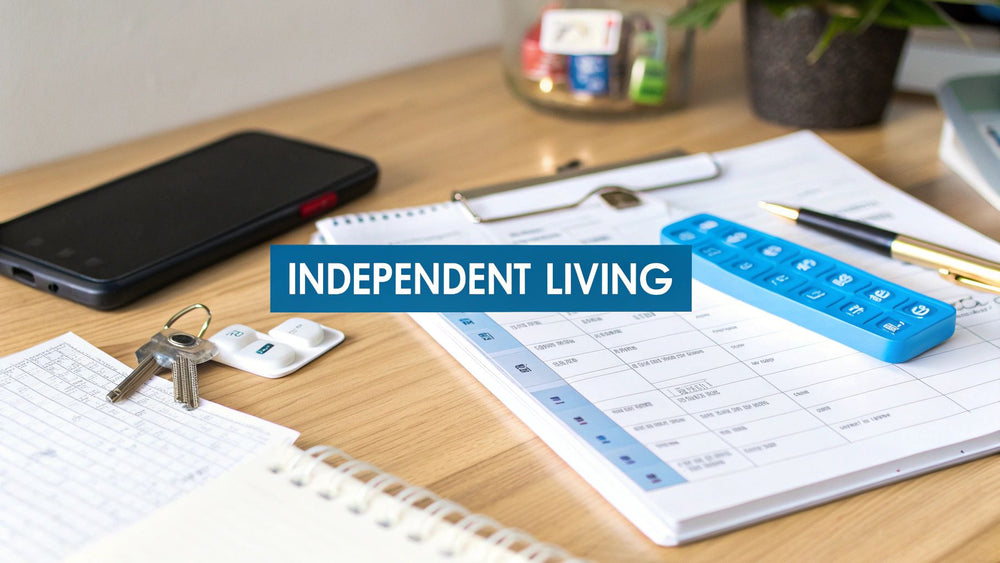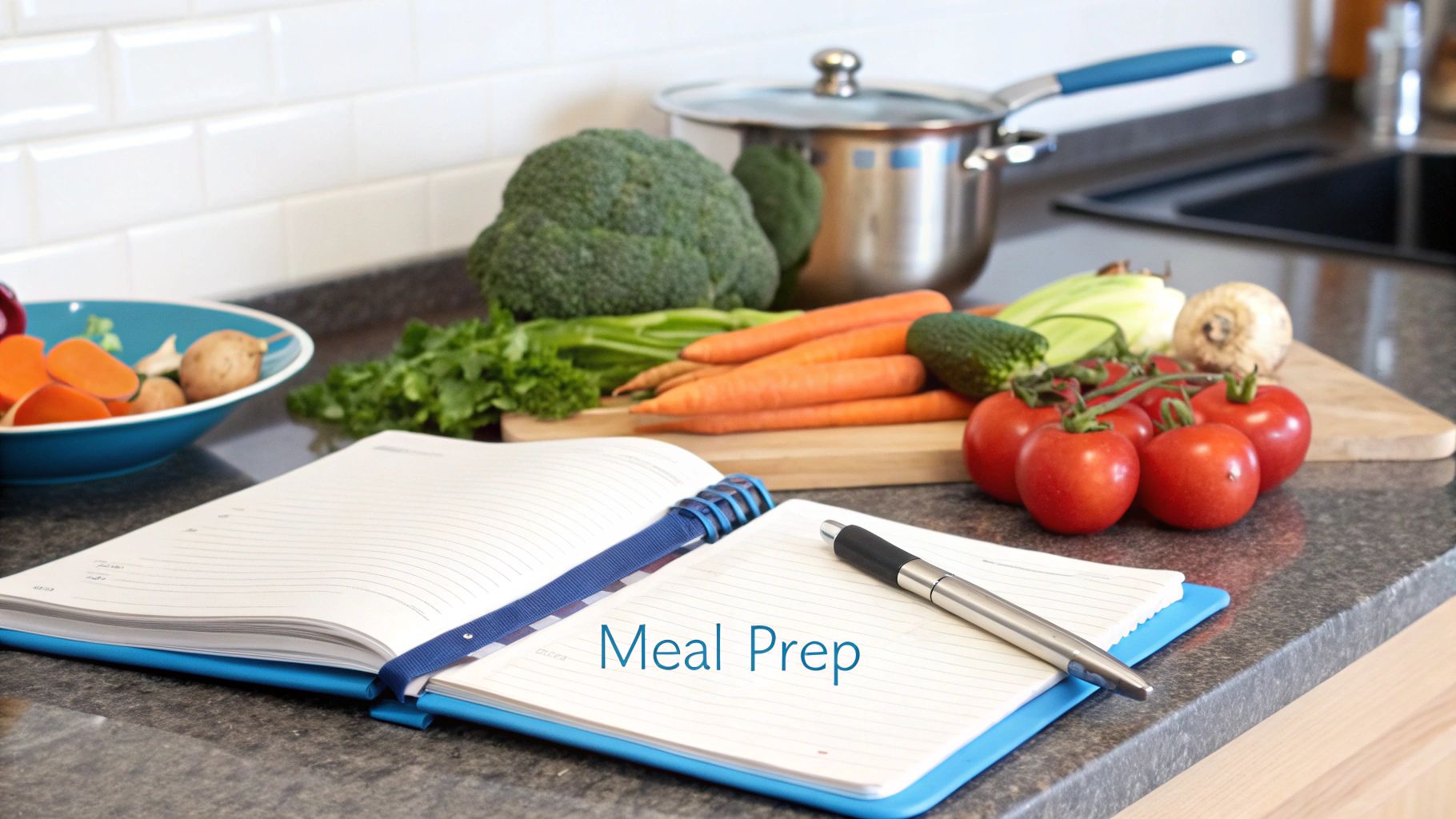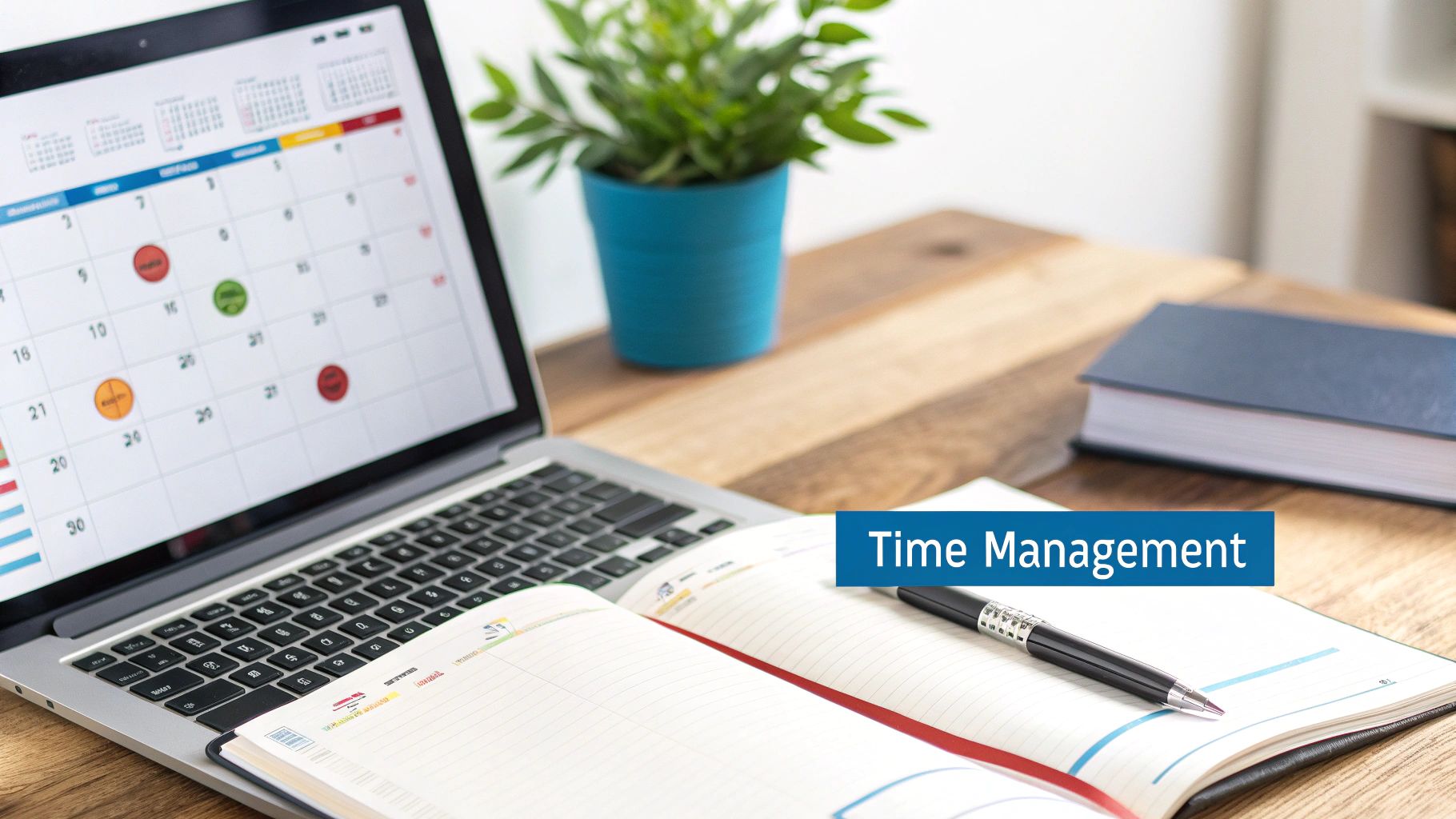Essential Independent Living Skills Checklist for 2025

True independence is more than just a goal; it's a journey of building confidence and capability in every part of daily life. For individuals on the NDIS pathway, mastering these skills is the key to unlocking a future with more choice, control, and personal freedom. This comprehensive independent living skills checklist is designed not just as a list, but as a detailed roadmap for achieving greater autonomy.
We will explore seven critical areas, breaking each one down into manageable steps, offering practical tips, and providing specific guidance on how your NDIS funding can support your development. Whether you're just starting your journey or looking to refine specific abilities, this guide provides actionable strategies to help you thrive. As you embark on this journey, practising exercises to boost self-confidence can significantly enhance your progress and overall well-being.
This article will delve into everything from managing your personal finances and maintaining your home to navigating transport, healthcare, and building strong social connections. Our goal is to ensure you have the tools and insights needed to live life on your own terms. We'll cover:
- Personal Financial Management: Handling money, budgeting, and paying bills.
- Meal Planning and Cooking: Creating healthy meals and managing a kitchen.
- Household Maintenance: Keeping your living space clean and organised.
- Transportation Management: Navigating your community safely and efficiently.
- Healthcare Self-Management: Booking appointments and managing your health.
- Time Management and Organization: Structuring your days for success.
- Communication and Social Skills: Building and maintaining relationships.
Let’s begin building your foundation for a more independent future.
1. Personal Financial Management
Mastering personal financial management is a cornerstone of true independence. It encompasses the skills needed to confidently manage your money, including creating a budget, handling banking, paying bills on time, and making smart financial choices. This skill is crucial for achieving stability, steering clear of debt, building a savings buffer, and working towards long-term life goals. As a foundational part of any independent living skills checklist, financial literacy empowers you to take control of your future.

This skill set is about more than just counting dollars; it’s about creating a sustainable lifestyle. It allows you to plan for holidays, save for a new piece of technology, or simply enjoy a coffee with friends without financial stress. For NDIS participants, strong financial skills can also help in managing personal contributions or funds alongside your plan, ensuring all aspects of your life are well-resourced and organised.
How to Develop Financial Management Skills
Building financial confidence is a step-by-step process. The key is to start small and create habits that stick.
- Create a Simple Budget: Don't overcomplicate it. A great starting point is the 50/30/20 rule. Allocate 50% of your income to needs (rent, groceries, bills), 30% to wants (hobbies, entertainment), and 20% to savings and debt repayment.
- Embrace Technology: Use modern tools to your advantage. Budgeting apps like You Need A Budget (YNAB) or Pocketbook can connect to your bank accounts, track spending automatically, and provide a clear picture of where your money is going.
- Automate Your Finances: Set up automatic transfers to your savings account on payday. This "pay yourself first" strategy ensures you are consistently building your savings without having to think about it. Similarly, setting up direct debits for regular bills like your phone or rent helps avoid late fees.
- Regularly Review and Adjust: Dedicate a short amount of time each month to review your bank statements and budget. This helps you catch any errors, see where you might be overspending, and adjust your plan for the month ahead.
Key Insight: Financial management isn't about restriction; it's about empowerment. A clear budget gives you permission to spend on what you value while ensuring your essential needs and future goals are always covered.
NDIS Support for Financial Skills
If you find managing finances challenging, your NDIS plan may be able to provide support. Under the Capacity Building support category, you can potentially use funding for training in financial literacy and budgeting. This could involve working one-on-one with a support worker or attending a specialised workshop to learn practical skills. Discussing this goal with your Local Area Coordinator (LAC) or support coordinator can help you identify how to best include it in your plan. To gain full confidence in managing your own life, a guide to financial planning for beginners can provide a solid foundation.
2. Meal Planning and Cooking
The ability to plan, shop for, and prepare your own meals is a vital life skill that directly impacts health, budget, and overall wellbeing. It involves a range of abilities, from creating a weekly menu and writing a grocery list to understanding food safety and mastering basic cooking techniques. This skill is a core component of any independent living skills checklist because it provides control over your nutrition and finances, fostering a sense of self-reliance and accomplishment in the kitchen.

This skill set extends beyond just following a recipe; it’s about creating a healthy and enjoyable routine around food. It allows you to explore new flavours, cater to your dietary needs, and avoid the expense and lower nutritional value of frequent takeaway meals. For NDIS participants, mastering meal preparation can be an empowering goal that enhances daily living, improves health outcomes, and provides a structured, creative outlet.
How to Develop Meal Planning and Cooking Skills
Building confidence in the kitchen is an achievable journey that starts with simple steps and builds over time. The goal is to make cooking a positive and manageable part of your daily routine.
- Start with Simple Recipes: Begin with straightforward dishes that have few ingredients, like scrambled eggs, pasta with a simple sauce, or a basic stir-fry. As your confidence grows, you can gradually move on to more complex recipes from sources like Tasty or Allrecipes.
- Plan Your Meals Weekly: Dedicate a small amount of time each week to plan what you'll eat. This prevents decision fatigue and impulse buys. Write a grocery list organised by the store's layout to make shopping more efficient and less overwhelming.
- Embrace Batch Cooking: Prepare larger quantities of staple ingredients like rice, quinoa, roasted vegetables, or grilled chicken. You can then mix and match these components throughout the week for quick and easy meals, a popular technique known as "meal prep".
- Learn Essential Food Safety: Understand the basics of safe food handling to prevent illness. This includes knowing correct cooking temperatures, proper storage methods for leftovers (e.g., in the fridge for 3-4 days), and how to avoid cross-contamination by using separate cutting boards for raw meat and vegetables.
Key Insight: Effective meal planning isn't about being a gourmet chef; it's about organising your food life. A simple plan empowers you to eat healthier, save money, and reduce the daily stress of deciding what to cook.
NDIS Support for Cooking Skills
If developing your cooking abilities is one of your goals, your NDIS plan can offer valuable assistance. Under the Capacity Building or Core Supports categories, you may be able to access funding for skill development in this area. This could involve having a support worker assist you with meal planning, grocery shopping, and cooking in your own home. For those seeking structured guidance, a guide to NDIS meal preparation can offer more detailed insights. Discussing this goal with your support coordinator will help you integrate it effectively into your NDIS plan.
3. Household Maintenance and Cleaning
Maintaining a clean, organised, and functional living space is a vital component of any independent living skills checklist. This involves more than just a quick tidy-up; it's a systematic approach that includes regular cleaning routines, basic home repairs, and preventive maintenance. Mastering these skills ensures a safe and healthy environment, helps preserve the value of your home, and cultivates a strong sense of personal responsibility and pride in your surroundings.

This skill set empowers you to create a comfortable and welcoming home. It prevents small issues, like a dripping tap or a cluttered walkway, from becoming major problems. For NDIS participants, having a well-maintained home is crucial for safety and accessibility, ensuring your living space fully supports your daily needs and promotes overall wellbeing.
How to Develop Household Maintenance Skills
Building good habits is the key to keeping your home in top shape without feeling overwhelmed. A structured approach can make cleaning and maintenance manageable and even rewarding.
- Create a Cleaning Schedule: Don't try to clean everything at once. Break tasks down daily, weekly, and monthly. For example, dedicate Mondays to bathrooms, Tuesdays to the kitchen, and so on. This approach, popularised by systems like FlyLady, prevents buildup and makes the workload feel much lighter.
- Clean As You Go: Adopt the habit of tidying up immediately. Wipe down kitchen counters after preparing a meal, put things away after using them, and rinse dishes straight after eating. This simple strategy significantly reduces the time needed for deeper cleaning sessions.
- Learn Basic Repairs: You don’t need to be a professional tradie to handle minor issues. Watch online tutorials to learn how to change a lightbulb, unblock a sink with a plunger, or tighten a loose cabinet handle. Having a basic toolkit with a hammer, screwdrivers, and a wrench is a great start.
- Declutter and Organise: Use methods like Marie Kondo’s KonMari to simplify your space. A clutter-free home is not only easier to clean but also has a positive impact on your mental health. Regularly go through your belongings and donate or discard what you no longer need.
Key Insight: A well-maintained home is a reflection of self-care. It’s about creating a sanctuary that is not only clean and functional but also a source of comfort, safety, and personal pride.
NDIS Support for Household Skills
If you require assistance to maintain your home due to your disability, the NDIS can offer support. Under the Core Supports category, you may be able to use funding for assistance with household tasks. This could involve a support worker helping with cleaning, laundry, or gardening. Furthermore, the Capacity Building category can fund training to help you learn these skills yourself, empowering you to become more independent. Discuss your home environment goals with your support coordinator to see how these supports can be integrated into your NDIS plan.
4. Transportation Management
Effective transportation management is the key to unlocking community access and personal freedom. It involves the ability to plan, navigate, and utilise various transport options, from driving a personal vehicle to mastering public transport or using rideshare services. This skill is vital for reliably getting to work, appointments, and social events, ensuring you can participate fully in your community. As a critical component of any independent living skills checklist, mastering transport empowers you to move through the world on your own terms.

This skill set extends beyond just getting from point A to B; it's about creating a reliable and flexible mobility plan. It enables you to confidently visit friends, explore new places, or simply run errands without depending on others. For NDIS participants, strong transport skills are essential for attending therapies, engaging in community activities, and achieving personal goals outlined in your plan, fostering a true sense of autonomy.
How to Develop Transportation Management Skills
Building your confidence in getting around is an achievable goal. The key is to start with what’s available and gradually expand your options.
- Master Local Public Transport: Begin by researching your local bus, train, or tram routes. Use apps like Google Maps or your local transit authority's app to plan a short, low-pressure trip. Learn how to read timetables and use a travel card or contactless payment.
- Plan for Driving: If driving is a goal, start by researching the process for obtaining a learner's permit and driver's licence. Budget for all associated costs, including lessons, vehicle purchase, registration, insurance, fuel, and maintenance. Learning basic car care, like checking tyre pressure and oil levels, is also a valuable skill.
- Explore Alternatives: Familiarise yourself with rideshare apps like Uber or local taxi services for times when public transport isn't suitable. For shorter distances, consider walking or cycling routes. Always have a backup plan in case your primary mode of transport is unavailable.
- Use Technology to Your Advantage: Navigation apps are indispensable tools for planning routes, getting real-time traffic updates, and discovering new ways to travel. Many public transport apps also provide live tracking so you know exactly when your service will arrive.
Key Insight: Transportation management is not about choosing one single option; it's about building a versatile system of mobility. Knowing how to use multiple forms of transport provides a safety net and ensures you're never left stranded.
NDIS Support for Transportation Skills
Your NDIS plan can be a powerful tool for improving your transport independence. The Capacity Building budget can fund training to help you learn to use public transport, or driving lessons if it's a specific goal in your plan. The Core Supports budget may also provide funding for transport to help you access community activities and appointments. It’s important to understand the different ways your plan can assist, and you can explore more about what is available from NDIS transport providers. Discussing your mobility goals with your support coordinator will help you effectively utilise your funding to build confidence on the move.
5. Healthcare Self-Management
Taking charge of your personal health is a fundamental skill for independent living. Healthcare self-management involves everything from finding the right doctors and scheduling appointments to understanding medication, managing health records, and navigating the healthcare system. Developing these skills is essential for maintaining your well-being, getting timely care, and making informed decisions about your body. This element of an independent living skills checklist empowers you to become an active partner in your own healthcare journey.
This skill set goes beyond simply visiting a GP when you're unwell. It’s about proactive, preventative care and being organised enough to handle health issues confidently as they arise. This could mean using a patient portal to communicate with your doctor, setting up automatic prescription refills, or using an app to track symptoms. For NDIS participants, strong healthcare management skills are vital for coordinating with various health professionals and ensuring your health needs are met alongside your other disability supports.
How to Develop Healthcare Self-Management Skills
Building confidence in managing your health is achievable through organisation and proactive habits. Small, consistent steps can make a significant difference.
- Keep Organised Health Records: Create a dedicated folder, either digital or physical, for all your health information. Include your Medicare and private health insurance details, a list of current medications and dosages, vaccination history, and contact information for your GP and specialists.
- Prepare for Appointments: Before a medical appointment, write down a list of questions, concerns, and any symptoms you've experienced. This helps you make the most of your time with the doctor and ensures you don’t forget anything important.
- Understand Your Insurance: Take the time to understand your health cover, whether it’s Medicare or a private fund. Know what is covered, what the limitations are, and what out-of-pocket costs you can expect. This prevents surprises and helps you plan for expenses.
- Build a Healthcare Team: Establish a good relationship with a primary care provider (GP) who you trust. They can act as the central point for your care, coordinating with specialists and providing consistent advice. Don't delay seeking care if you notice concerning symptoms.
Key Insight: Effective healthcare self-management is not about becoming a medical expert. It's about being an organised, informed, and proactive manager of your own health team and information, enabling you to advocate for the best possible care.
NDIS Support for Healthcare Skills
If you require assistance with managing complex health needs, your NDIS plan can offer valuable support. The Capacity Building category can fund training to help you develop skills in this area, while the Core Supports budget may cover a support worker to assist with tasks like attending appointments or managing medications. For more complex clinical needs at home, you might explore options like community nursing. You can gain a deeper understanding of what is community nursing and how it can be integrated into your support plan. Discussing these health-related goals with your support coordinator is the first step to getting the right help.
6. Time Management and Organisation
Effective time management and organisation are vital skills for navigating daily life with confidence and reducing stress. They involve the systematic approach to planning, prioritising, and managing your time to successfully balance appointments, personal responsibilities, and leisure activities. Mastering these skills is essential for maintaining a structured and fulfilling independent lifestyle, ensuring that important tasks are completed and personal goals are pursued. As a key component of any independent living skills checklist, strong organisational abilities empower you to take control of your schedule and your life.
This skill set is about more than just keeping a diary; it's about creating a framework that supports your wellbeing. It allows you to reliably attend medical appointments, meet up with friends, manage household chores, and dedicate time to hobbies without feeling overwhelmed. For NDIS participants, solid time management skills are crucial for coordinating support worker schedules, therapy sessions, and community activities, ensuring you get the most out of your plan.
How to Develop Time Management and Organisational Skills
Building these skills is an incremental process focused on creating reliable systems and habits that work for you.
- Use a Single Calendar System: Centralise all your commitments. Whether it's a physical planner or a digital tool like Google Calendar, keeping everything in one place prevents double bookings and ensures you have a clear overview of your week.
- Implement Time-Blocking: Allocate specific blocks of time in your calendar for particular tasks, just like you would for an appointment. This technique, popularised by experts like Cal Newport, helps you focus on one thing at a time and protects your schedule from interruptions.
- Batch Similar Tasks: Group related activities together and complete them in one session for greater efficiency. For example, you could dedicate a specific block of time to run all your errands, or another to handle all your emails and phone calls for the day.
- Build in Buffer Time: Avoid a back-to-back schedule by adding 15-30 minutes of buffer time between appointments or tasks. This accounts for potential travel delays or tasks that run longer than expected, reducing stress and keeping your day on track.
Key Insight: Great organisation isn't about rigid control; it's about creating freedom. A well-managed schedule frees up mental energy, reduces anxiety about forgetting things, and ensures you have dedicated time for rest and enjoyment.
NDIS Support for Organisational Skills
If you find planning and organising your time to be a challenge, your NDIS plan can offer valuable assistance. Under the Capacity Building support category, you can use funding to access training that helps you develop these crucial executive functioning skills. This could involve working with a support worker or a specialised therapist to learn practical strategies, such as using productivity apps like Todoist or implementing methodologies like Getting Things Done (GTD). Discussing this goal with your support coordinator is a great first step to including it in your plan. To explore how these supports fit into your NDIS journey, you can find more information about NDIS Capacity Building supports.
7. Communication and Social Skills
Strong communication and social skills are the threads that weave us into the fabric of our community. This skill set covers the ability to effectively express yourself and understand others in diverse situations, from professional settings and personal relationships to conflict resolution and community engagement. Mastering these abilities is vital for building meaningful connections, advocating for your needs, and participating fully in society. As a crucial element of any independent living skills checklist, well-developed social skills empower you to navigate life with confidence and build a strong support network.
This area of development goes beyond just talking; it’s about creating understanding and mutual respect. It enables you to engage in community volunteer work, network for a job, or simply handle a disagreement with a housemate constructively. For NDIS participants, these skills are fundamental for clearly communicating needs and preferences to support workers, participating in plan meetings, and building friendships through community activities, making every interaction more positive and productive.
How to Develop Communication and Social Skills
Improving how you connect with others is a journey of practice and self-awareness. The goal is to build confidence one conversation at a time.
- Practise Active Listening: This means focusing completely on the speaker and understanding their message. A great technique is to summarise what they’ve said back to them ("So, what I hear you saying is...") to confirm your understanding before you respond.
- Learn to Express Your Needs Clearly: Clearly stating your needs and boundaries is not aggressive; it's assertive. Use "I" statements to express your feelings without blaming others, for example, "I feel overwhelmed when plans change at the last minute."
- Balance Digital and In-Person Skills: In today's world, both are essential. Practise professional email etiquette and how to use platforms like LinkedIn, but also make time for face-to-face interactions to develop skills in reading body language and tone of voice.
- Seek Out Low-Stakes Practice: Join a club, volunteer, or participate in a group hobby. These environments provide a relaxed setting to practise conversations, learn social cues, and build relationships without high pressure. Organisations like Toastmasters are excellent for building public speaking confidence.
Key Insight: Effective communication isn't about winning arguments or being the most talkative person in the room. It’s about creating genuine connections by ensuring others feel heard, respected, and understood.
NDIS Support for Social Skills
If you want to build your confidence in social situations, your NDIS plan can offer significant support through its Capacity Building budget. Funding can be used for therapies or programs designed to enhance communication, social interaction, and relationship-building skills. This might include one-on-one sessions with a therapist, joining a social skills group, or working with a support worker to practise these skills in real-world community settings. To discover more about building these abilities, explore these insights into inclusive activities for developing social skills. Discussing this as a goal with your support coordinator will help ensure it's properly included in your NDIS plan.
7 Key Independent Living Skills Comparison
| Skill Area | Implementation Complexity 🔄 | Resource Requirements ⚡ | Expected Outcomes 📊 | Ideal Use Cases 💡 | Key Advantages ⭐ |
|---|---|---|---|---|---|
| Personal Financial Management | Moderate – requires ongoing discipline and learning | Low to Moderate – apps, banking tools, education | Financial stability, debt avoidance, savings growth | Independent adults managing money, budgeting, credit | Financial security, long-term planning, credit building |
| Meal Planning and Cooking | Moderate to High – planning, prep, cooking skills | Moderate – kitchen tools, groceries, recipes | Better nutrition, cost savings, cooking confidence | Individuals seeking healthy diet, budget-friendly meals | Saves money, promotes health, creativity in cooking |
| Household Maintenance & Cleaning | Moderate – regular routines, basic repairs | Low to Moderate – cleaning supplies, basic tools | Clean, organized home, reduced repair costs | Homeowners/renters maintaining living space | Healthier environment, cost savings, increased pride |
| Transportation Management | Moderate – learning driving/public transit use | Moderate to High – vehicle costs, transit fares | Independence in mobility, access to work/social life | People requiring transport options for daily activities | Expanded access, emergency readiness, mobility freedom |
| Healthcare Self-Management | Moderate to High – navigating complex systems | Low to Moderate – apps, insurance, records | Continuous care, reduced costs, health advocacy | Managing personal health, appointments, insurance | Preventive care, better health management, advocacy |
| Time Management and Organization | Moderate – habit building, system maintenance | Low – calendars, apps, planners | Increased productivity, stress reduction | Balancing work, personal life, goal achievement | Better balance, task completion, reduced stress |
| Communication and Social Skills | Moderate to High – practice and refinement | Low – training programs, social activities | Strong relationships, effective advocacy | Professional and personal communication, networking | Improved relationships, career advancement, conflict reduction |
Putting Your Skills Into Action with the Right Support
Embarking on the journey toward greater independence is a significant and empowering step. This article has provided a detailed independent living skills checklist, breaking down crucial areas from personal financial management and meal preparation to healthcare self-management and building social connections. Each skill represents a pillar supporting a more self-directed, confident, and fulfilling life. However, a checklist is merely a starting point; a map for the journey ahead. The real transformation happens when this knowledge is put into consistent, practical action, tailored to your unique goals and circumstances.
The path to mastering these skills is not about achieving perfection overnight. It's a process of gradual growth, celebrating small victories, and learning from challenges along the way. Think of it less as a test you must pass and more as a personal development project. The key is to recognise that progress in one area often creates a positive ripple effect across others. For instance, mastering your transport schedule (Transportation Management) directly supports your ability to attend social events (Communication and Social Skills) and keep medical appointments (Healthcare Self-Management).
From Checklist to Lived Experience
The true value of this independent living skills checklist is realised when it becomes a living document, a guide that adapts with you. The journey is rarely linear, and that's perfectly okay. Some weeks, you might focus heavily on mastering new recipes, while other times, your energy might be channelled into creating a robust personal budget or learning to navigate public transport with confidence.
The most crucial element in this process is having the right support system. This is where the power of your NDIS plan can be fully unlocked. Your plan is not just about funding; it's a tool designed to provide you with the resources, mentorship, and personalised assistance needed to turn your aspirations into achievements. A skilled support worker doesn't just perform tasks for you; they work alongside you, acting as a coach, a mentor, and a partner in your growth. They can help break down daunting goals into manageable steps, provide encouragement when you face a setback, and celebrate your successes with you.
Key Takeaway: True independence is not about doing everything alone. It’s about having the confidence and competence to direct your own life, supported by a network that respects your choices and champions your growth.
Your Next Steps on the Path to Independence
As you reflect on the skills outlined in this guide, consider which one or two areas you feel most motivated to tackle first. Perhaps it’s setting up a simple weekly budget or learning to cook three new, healthy meals. Starting small builds momentum and confidence.
Here are some actionable next steps:
- Review Your Goals: Look at your NDIS plan and personal goals. How do they align with the skills on this checklist?
- Identify a Starting Point: Choose one skill that feels both important and achievable for you to begin with.
- Seek Specialised Support: Talk to your support coordinator or provider about how you can use your NDIS funding to build capacity in these specific areas. This could involve finding a support worker with teaching skills or enrolling in a community program.
Living with greater independence means having more choice and control over your daily life, from what you eat for dinner to how you spend your weekends. It means building the confidence to pursue hobbies, engage with your community, and manage your responsibilities effectively. For individuals and families in Adelaide and regional South Australia, this journey is best navigated with a local, compassionate partner who understands your needs.
At Vana Care, we specialise in transforming this independent living skills checklist from a document into your daily reality. Our personalised in-home support, community access programs, and Supported Independent Living (SIL) arrangements are designed to build your capacity, confidence, and control. If you are ready to take the next step, connect with the team at Vana Care to discuss how we can create a support plan that empowers you to live the life you choose.


